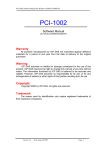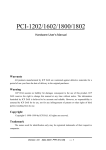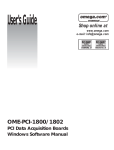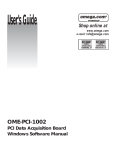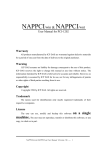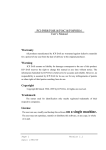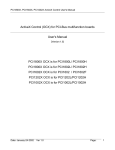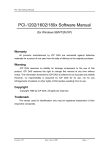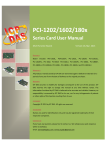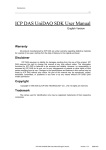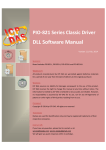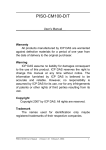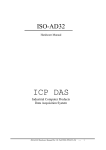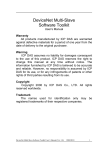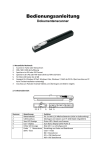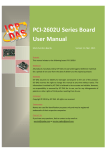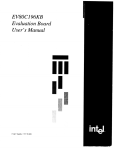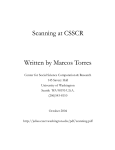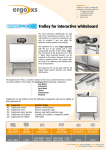Download For OME-PCI-1202 Card
Transcript
User’s Guide Shop online at www.omega.com e-mail: [email protected] OME-PCI-1202/1602/1800/1802 BOARDS DOS Software User’s Manual OMEGAnet ® Online Service www.omega.com Internet e-mail [email protected] Servicing North America: USA: ISO 9001 Certified Canada: One Omega Drive, P.O. Box 4047 Stamford CT 06907-0047 TEL: (203) 359-1660 e-mail: [email protected] 976 Bergar Laval (Quebec) H7L 5A1, Canada TEL: (514) 856-6928 e-mail: [email protected] FAX: (203) 359-7700 FAX: (514) 856-6886 For immediate technical or application assistance: USA and Canada: Sales Service: 1-800-826-6342 / 1-800-TC-OMEGA® Customer Service: 1-800-622-2378 / 1-800-622-BEST® Engineering Service: 1-800-872-9436 / 1-800-USA-WHEN® TELEX: 996404 EASYLINK: 62968934 CABLE: OMEGA Mexico: En Español: (001) 203-359-7803 FAX: (001) 203-359-7807 e-mail: [email protected] [email protected] Servicing Europe: Benelux: Postbus 8034, 1180 LA Amstelveen, The Netherlands TEL: +31 (0)20 3472121 FAX: +31 (0)20 6434643 Toll Free in Benelux: 0800 0993344 e-mail: [email protected] Czech Republic: Frystatska 184, 733 01 Karviná, Czech Republic TEL: +420 (0)59 6311899 FAX: +420 (0)59 6311114 Toll Free: 0800-1-66342 e-mail: [email protected] France: 11, rue Jacques Cartier, 78280 Guyancourt, France TEL: +33 (0)1 61 37 29 00 FAX: +33 (0)1 30 57 54 27 Toll Free in France: 0800 466 342 e-mail: [email protected] Germany/Austria: Daimlerstrasse 26, D-75392 Deckenpfronn, Germany TEL: +49 (0)7056 9398-0 Toll Free in Germany: 0800 639 7678 e-mail: [email protected] United Kingdom: ISO 9002 Certified FAX: +49 (0)7056 9398-29 One Omega Drive, River Bend Technology Centre Northbank, Irlam, Manchester M44 5BD United Kingdom TEL: +44 (0)161 777 6611 FAX: +44 (0)161 777 6622 Toll Free in United Kingdom: 0800-488-488 e-mail: [email protected] It is the policy of OMEGA to comply with all worldwide safety and EMC/EMI regulations that apply. OMEGA is constantly pursuing certification of its products to the European New Approach Directives. OMEGA will add the CE mark to every appropriate device upon certification. The information contained in this document is believed to be correct, but OMEGA Engineering, Inc. accepts no liability for any errors it contains, and reserves the right to alter specifications without notice. WARNING: These products are not designed for use in, and should not be used for, patient-connected applications. Table of Contents 1 2 3 INTRODUCTION .............................................................................................................................................. 3 1.1 SOFTWARE INSTALLATION ........................................................................................................................... 5 1.2 COMPILE & LINK USING MSC ...................................................................................................................... 8 1.3 COMPILE & LINK USING TC.......................................................................................................................... 9 1.4 COMPILE & LINK USING BC ....................................................................................................................... 10 C LANGUAGE LIBRARY.............................................................................................................................. 11 2.1 THE CONFIGURATION CODE TABLE ........................................................................................................... 14 2.2 OME-PCI-1202/1602/1800/1802 HEADER FILE ..................................................................................... 16 2.3 THE TESTING FUNCTIONS .......................................................................................................................... 25 2.4 THE M_FUNCTIONS ................................................................................................................................... 27 2.5 THE DIO FUNCTIONS ................................................................................................................................. 33 2.6 THE DA FUNCTIONS .................................................................................................................................. 34 2.7 THE AD FIXED-MODE FUNCTIONS ............................................................................................................. 35 2.8 THE MAGICSCAN FUNCTIONS .................................................................................................................... 40 2.9 THE PLUG & PLAY FUNCTIONS .................................................................................................................. 45 2.10 THE CONTINUOUS CAPTURE FUNCTIONS ................................................................................................... 50 2.11 THE OTHER FUNCTIONS ............................................................................................................................. 52 DEMO PROGRAMS ....................................................................................................................................... 54 Version: 3.1 Date: 1999/8 Page 2 OME-PCI-1202/1602/1800/1802 Software User’s Manual for DOS 1 . Introduction The OME-PCI-1202/1602/1800/1802 DOS driver is a collection of library for DOS application. This library can be called by TC 2.x, BC 3.x and MSC 5.x. This library can perform a variety of data acquisition operations as follows: z z z z z z Get software version Initialization Digital Input/Output A/D conversion D/A conversion Demo The driver source is given in the companion floppy disk. There are 19 demo programs given in the companion CD-ROM or floppy disk. The user can print out theses files for reference. The hardware I/O control register & its function are given in the “OME-PCI-1202/1602/ 1800/1802 Hardware User’s Manual”. The user should refer to “OME-PCI-1202/1602/1800/1802 Hardware User’s Manual” for more information. Version 3.1 Date: 1999/08 Page 3 OME-PCI-1202/1602/1800/1802 Software User’s Manual for DOS 12-bit DAC Resolution for OME-PCI-1202(H/L)/1602/1602F/1800(H/L)/1802(H/L) • Data Input MSB 1111 1000 0000 1000 0111 1111 0000 0000 Analog Output LSB 1111 1111 0001 0000 0000 1111 0000 +Vref (2047/2048) +Vref (1/2048) 0 Vlots -Vref (1/2048) -Vref (2048/2048) Bipolar Output Code. Vref is +5V or +10V selected by J1. • 12-bit ADC Resolution for OME-PCI-1202(H/L)/1800(H/L)/1802(H/L) Analog Input +9.99512V 0V -4.88m V -10V Digital Output Binary Code MSB 0111 0000 1111 1000 1111 0000 1111 0000 LSB 1111 0000 1111 0000 Hex Code 7FF 000 FFF 800 Input Voltages and Output Codes. • 16-bit ADC Resolution for OME-PCI-1602/1602F Card Analog Input Digital Output Binary Code Hex Code +9.999695V 0V -305uv -10V MSB 0111 0000 1111 1000 7FFF 0000 FFFF 8000 1111 0000 1111 0000 1111 0000 1111 0000 LSB 1111 0000 1111 0000 Input Voltages and Output Codes. Page 4 Version : 3.1 Date:1999/08 OME-PCI-1202/1602/1800/1802 Software User’s Manual for DOS 1.1 Software Installation It is recommended to install the OME-PCI-1202/1602/1800/1802 DOS driver to your hard disk and backup the companion CD ROM. The contents of OME-PCI-1202/1602/1800/1802 DOS CD ROM are given as follows: Refer to CD ROM readme.txt file. 1.1.1 Software content for OME-PCI-1202(H/L) …\1202\TC>................................................For Turbo C 2.0 or later user …\1202\BC>................................................For Borland C++ 3.0 later user …\1202\MSC>.............................................For Microsoft C 5.1 later user …1202\TC\DRIVER>P1202DR.H..............Header file …\1202\TC\DRIVER>P1202TCL.C...........Driver source …\1202\TC\DRIVER>IOPORT.C..............32-bit I/O port driver source …\1202\TC\LIB>P1202.H...........................Header file …\1202\TC\LIB>P1202TCL.LIB................Large model library …\1202\TC\LIB>P1202TCH.LIB...............Huge model library …\1202\TC\LIB>IOPORTL.LIB................Large model library …\1202\TC\LIB>IOPORTH.LIB................Huge model library …\1202\TC\DEMO>P1202TCL.LIB..........Large model library …\1202\TC\DEMO>IOPORTL.LIB...........Large model library …\1202\TC\DEMO>P1202.H.....................Header file …\1202\TC\DEMO>DEMO1.C..................demo1 program source …\1202\TC\DEMO>DEMO1.PRJ..............demo1 project file …\1202\TC\DEMO>DEMO1.EXE.............demo1 execution …\1202\TC\DEMO>DEMO2.C .................demo2 program source : : Version 3.1 Date: 1999/08 Page 5 OME-PCI-1202/1602/1800/1802 Software User’s Manual for DOS : …\1202\TC\DEMO>DEMO19.C.....................demo19 program source …\1202\TC\DEMO>DEMO19.PRJ.................demo19 project file …\1202\TC\DEMO>DEMO19.EXE................demo19 execution file 1.1.2 Software content for OME-PCI-1602/1602F …\1602\TC>.............................................For Turbo C 2.0 or later user …\1602\BC>.............................................For Borland C++ 3.0 later user …\1602\MSC>..........................................For Microsoft C 5.1 later user ...\1602\TC\DRIVER>P1602DR.H...........Header file …\1602\TC\DRIVER>P160XTCL.C.......Driver source …\1602\TC\DRIVER>IOPORT.C...........32-bit I/O port driver source …\1602\TC\LIB>P1602.H.......................Header file …\1602\TC\LIB>P1602TCL.LIB............Large model library …\1602\TC\LIB>P1602TCH.LIB............Huge model library …\1602\TC\LIB>IOPORTL.LIB.............Large model library …\1602\TC\LIB>IOPORTH.LIB.............Huge model library …\1602\TC\DEMO>P1602TCL.LIB.......Large model library …\1602\TC\DEMO>IOPORTL.LIB........Large model library …\1602\TC\DEMO>P1602.H..................Header file …\1602\TC\DEMO>DEMO1.C...............demo1 program source …\1602\TC\DEMO>DEMO1.PRJ...........demo1 project file …\1602\TC\DEMO>DEMO1.EXE..........demo1 execution file : : : …\1602\TC\DEMO>DEMO19.C.............demo1 program source …\1602\TC\DEMO>DEMO19.PRJ.........demo1 project file …\1602\TC\DEMO>DEMO19.EXE........demo1 execution file Page 6 Version : 3.1 Date:1999/08 OME-PCI-1202/1602/1800/1802 Software User’s Manual for DOS 1.1.3 Software content for OME-PCI-1800(H/L)/1802(H/L) …\180X\TC>...................................................For Turbo C 2.0 or later user …\180X\BC>...................................................For Borland C++ 3.0 later user …\180X\MSC>................................................For Microsoft C 5.1 later user …\180X\TC\DRIVER>P180XDR.H...............Header file …\180X\TC\DRIVER>P180XTCL.C.............Driver source …\180X\TC\DRIVER>IOPORT.C.................32-bit I/O port driver source …\180X\TC\LIB>P180X.H............................Header file …\180X\TC\LIB>P180XTCL.LIB.................Large model library …\180X\TC\LIB>P180XTCH.LIB................Huge model library …\180X\TC\LIB>IOPORTL.LIB..................Large model library …\180X\TC\LIB>IOPORTH.LIB..................Huge model library …\180X\TC\DEMO>P180XTCL.LIB...........Large model library …\180X\TC\DEMO>IOPORTL.LIB.............Large model library …\180X\TC\DEMO>P180X.H......................Header file …\180X\TC\DEMO>DEMO1.C...................demo1 program file …\180X\TC\DEMO>DEMO1.PRJ...............demo1 project file …\180X\TC\DEMO>DEMO1.EXE..............demo1 execution file …\180X\TC\DEMO>DEMO2.C...................demo 2 program file : : : …\180X \TC\DEMO>DEMO19.C................demo19 program source …\180X\TC\DEMO>DEMO19.PRJ.............demo19 project file …\180X\TC\DEMO>DEMO19.EXE............demo19 execution file Version 3.1 Date: 1999/08 Page 7 OME-PCI-1202/1602/1800/1802 Software User’s Manual for DOS 1.2 Compile & link using MSC z z z z z z The including file is P1602.H There are two OME-PCI-1602/1602F library files: P1602MCH.LIB & P1602MCL.LIB There are two 32-bit I/O library files: IOPORTH.LIB & IOPORTL.LIB Support MSC 5.1 & later compiler LARGE model compiler & link command: CL /AL demo?.c P1602MCL.LIB IOPORTL.lib HUGE model compiler & link command: CL /AH demo?.c P1602MCH.LIB IOPORTH.LIB z Note: The steps are the same for OME-PCI-1202(H/L)/1800(H/L)/1802(H/L) card. Page 8 Version : 3.1 Date:1999/08 OME-PCI-1202/1602/1800/1802 Software User’s Manual for DOS 1.3 z z z z z z Compile & link using TC The including file is P1602.H There are two OME-PCI-1602/1602F library files: P1602TCH.LIB & P1602TCL.LIB There are two 32-bit I/O library files: IOPORTH.LIB & IOPORTL.LIB Support TC 2.x compiler Use the text editor to create a large model project file as follows: DEMO?.C P1602TCH.lib IOPORTH.lib Or use the text editor to create a huge model project file as follows: DEMO?.C P1602TCL.lib z z IOPORTL.lib Use TC integrated environment to select the correct project file Use TC integrated environment to select the correct compiler model z Press F9 to compile & link z Note: The steps are the same for OME-PCI-1202(H/L)/1800(H/L)/1802(H/L) card. Version 3.1 Date: 1999/08 Page 9 OME-PCI-1202/1602/1800/1802 Software User’s Manual for DOS 1.4 z z z z z z Compile & link using BC The including file is P1602.H There are two OME-PCI-1602/1602F library files: P1602BCH.LIB & P1602BCL.LIB There are two 32-bit I/O library files: IOPORTH.LIB & IOPORTL.LIB Support BC 3.x compiler Use BC integrated environment to create a large model project file as follows : DEMO?.C P1602BCL.LIB IOPORTL.LIB Or use BC integrated environment to create a huge model project file as follows : DEMO?.C P1602BCH.LIB z IOPORTH.LIB Use BC integrated environment to select the correct compiler model z Press F9 to compile & link z Note: The steps are the same for OME-PCI-1202(H/L)/1800(H/L)/1202(H/L) card. Page 10 Version : 3.1 Date:1999/08 OME-PCI-1202/1602/1800/1802 Software User’s Manual for DOS 2 . C Language Library The libraries are divided into several groups as follows: z The test functions z The M_Functions function z The D/I/O functions z The D/A function z The A/D fixed-mode functions z The A/D MagicScan mode functions z The A/D continuous capture functions z The Plug & Play functions z The other functions • For OME-PCI-1202(H/L) Card The functions of fixed-channel mode are given as follows : 1. P1202_SetChannelConfig Data in float format 2. P1202_AdPoling 3. P1202_AdsPolling 4. P1202_AdsPacer The functions of MagicScan mode are given as follows: 1. P1202_ClearScan Data in 12 bits HEX format 2. P1202_StartScan 3. P1202_AddToScan 4. P1202_SaveScan 5. P1202_ReadMagicScanResult The functions of M_Functions are given as follows: 1. P1202_M_FUN_1 2. P1202_M_FUN_2 3. P1202_M_FUN_3 The functions of continuous capture are given as follows: 1. P1202_Card0_StartScan 2. P1202_Card0_ReadData 3. P1202_Card0_Stop Version 3.1 Date: 1999/08 Page 11 OME-PCI-1202/1602/1800/1802 Software User’s Manual for DOS • For OME-PCI-1602/1602F Card The functions of fixed-channel mode are given as follows: 5. P1602_SetChannelConfig Data in float format 6. P1602_AdPoling 7. P1602_AdsPolling 8. P1602_AdsPacer The functions of MagicScan mode are given as follows: 6. P1602_ClearScan Data in 16 bits HEX format 7. P1602_StartScan 8. P1602_AddToScan 9. P1602_SaveScan 10. P1602_ReadMagicScanResult The functions of M_Functions are given as follows: 4. P1602_M_FUN_1 5. P1602_M_FUN_2 6. P1602_M_FUN_3 The functions of continuous capture are given as follows: 4. P1602_Card0_StartScan 5. P1602_Card0_ReadData 6. P1602_Card0_Stop Page 12 Version : 3.1 Date:1999/08 OME-PCI-1202/1602/1800/1802 Software User’s Manual for DOS • For OME-PCI-1800(H/L)/1802(H/L) Card The functions of fixed-channel mode are given as follows: 9. P180X_SetChannelConfig Data in float format 10. P180X_AdPoling 11. P180X_AdsPolling 12. P180X_AdsPacer The functions of MagicScan mode are given as follows: 11. P180X_ClearScan Data in 12 bits HEX format 12. P180X_StartScan 13. P180X_AddToScan 14. P180X_SaveScan 15. P180X_ReadMagicScanResult The functions of M_Functions are given as follows: 7. P180X_M_FUN_1 8. P180X_M_FUN_2 9. P180X_M_FUN_3 The functions of continuous capture are given as follows: 7. P180X_Card0_StartScan 8. P180X_Card0_ReadData 9. P180X_Card0_Stop Version 3.1 Date: 1999/08 Page 13 OME-PCI-1202/1602/1800/1802 Software User’s Manual for DOS 2.1 The Configuration Code Table 2.1.1 OME-PCI-1602/1602F Configuration Code Table Bipolar/Unipolar Input Signal Range Gain Settling Time Configuration Code Bipolar +/- 10V 1 3 us 0 Bipolar +/- 5.0V 2 3 us 1 Bipolar +/- 2.5V 4 3 us 2 Bipolar +/- 1.25V 8 3 us 3 2.1.2 OME-PCI-1202L/1800L/1802L Configuration Code Table Bipolar/Unipolar Input Signal Range Gain Settling Time Configuration Code Bipolar +/- 5V 1 3 us 0x00 Bipolar +/- 2.5V 2 3 us 0x01 Bipolar +/- 1.25V 4 3 us 0x02 Bipolar +/- 0.625V 8 3 us 0x03 Bipolar +/- 10V 0.5 3 us 0x04 Bipolar +/- 5V 1 3 us 0x05 Bipolar +/- 2.5V 2 3 us 0x06 Bipolar +/- 1.25V 4 3 us 0x07 Unipolar 0V ~ 10V 1 3 us 0x08 Unipolar 0V ~ 5V 2 3 us 0x09 Unipolar 0V ~ 2.5V 4 3 us 0x0A Unipolar 0V ~ 1.25V 8 3 us 0x0B Page 14 Version : 3.1 Date:1999/08 OME-PCI-1202/1602/1800/1802 Software User’s Manual for DOS 2.1.3 OME-PCI-1202H/1800H/1802H Configuration Code Table Bipolar/Unipolar Input Signal Range Gain Settling Time Configuration Code Bipolar +/- 5V 1 23 us 0x10 Bipolar +/- 0.5V 10 28 us 0x11 Bipolar +/- 0.05V 100 140 us 0x12 Bipolar +/- 0.005V 1000 1300 us 0x13 Bipolar +/- 10V 0.5 23 us 0x14 Bipolar +/- 1V 5 28 us 0x15 Bipolar +/- 0.1V 50 140 us 0x16 Bipolar +/- 0.01V 500 1300 us 0x17 Unipolar 0V ~ 10V 1 23 us 0x18 Unipolar 0V ~ 1V 10 28 us 0x19 Unipolar 0V ~ 0.1V 100 140 us 0x1A Unipolar 0V ~ 0.01V 1000 1300 us 0x1B Version 3.1 Date: 1999/08 Page 15 OME-PCI-1202/1602/1800/1802 Software User’s Manual for DOS 2.2 OME-PCI-1202/1602/1800/1802 Header File 2.2.1 #include #include #include #include #include #include P1202.H for OME-PCI-1202(H/L) Card <stdio.h> <stdlib.h> <dos.h> <conio.h> <math.h> <graphics.h> #define WORD unsigned int #define DWORD #define UCHAR unsigned long unsigned char #define NoError #define DriverHandleError #define DriverCallError #define AdControllerError #define M_FunExecError #define ConfigCodeError #define FrequencyComputeError #define HighAlarm #define LowAlarm #define AdPollingTimeOut #define AlarmTypeError #define FindBoardError #define AdChannelError #define DaChannelError #define InvalidateDelay #define DelayTimeOut #define InvalidateData #define FifoOverflow #define TimeOut #define ExceedBoardNumber #define NotFoundBoard Page 16 0 1 2 3 4 5 6 7 8 9 10 11 12 13 14 15 16 17 18 19 20 Version : 3.1 Date:1999/08 OME-PCI-1202/1602/1800/1802 Software User’s Manual for DOS #define OpenError 21 #define MAX_BOARD_NUMBER 16 float P1202_FloatSub2(float fA, float fB); short P1202_ShortSub2(short nA, short nB); WORD P1202_DriverInit(WORD *wBoards); WORD P1202_DriverClose(void); WORD P1202_GetDriverVersion(WORD *wDriverVersion); WORD P1202_GetConfigAddressSpace(WORD wBoardNo, WORD *wAddrTimer, *wAddrCtrl, WORD *wAddrDio, WORD *wAddrAdda); WORD P1202_DelayUs(WORD wDelayUs); WORD WORD P1202_ActiveBoard( WORD wBoardNo ); WORD P1202_WhichBoardActive(void); WORD P1202_Di(WORD *wDi); WORD P1202_Do(WORD wDo); WORD P1202_Da(WORD wDaChannel, WORD wDaVal); WORD P1202_SetChannelConfig(WORD wAdChannel, WORD wConfig); WORD P1202_AdPolling(float *fAdVal); WORD P1202_AdsPolling(float fAdVal[], WORD wNum); WORD P1202_AdsPacer(float fAdVal[], WORD wNum, WORD wSample); WORD P1202_M_FUN_1(WORD wDaFrequency, WORD wDaWave, float dfDaAmplitude, WORD wAdClock, WORD wAdNumber, WORD wAdConfig, float fAdBuf[], float fLowAlarm, float fHighAlarm); WORD P1202_M_FUN_2(WORD wDaNumber, WORD wDaWave, WORD wDaBuf[], WORD wAdClock, WORD wAdNumber, WORD wAdConfig, WORD wAdBuf[]); WORD P1202_M_FUN_3(WORD wDaFrequency, WORD wDaWave, float fDaAmplitude, WORD wAdClock, WORD wAdNumber, WORD wChannelStatus[], WORD wAdConfig[], float fAdBuf[], float fLowAlarm, float fHighAlarm); Version 3.1 Date: 1999/08 Page 17 OME-PCI-1202/1602/1800/1802 Software User’s Manual for DOS WORD P1202_Card0_StartScan(WORD wSampleRate, WORD wChannelStatus[], WORD wChannelConfig[], WORD wCount); WORD P1202_Card0_ReadData(void); void P1202_Card0_Stop(void); WORD P1202_ClearScan(void); WORD P1202_StartScan(WORD wSampleRate, WORD wNum); WORD P1202_AddToScan(WORD wAdChannel, WORD wAdConfig, WORD wAverage, WORD wLowAlarm, WORD wHighAlarm, WORD wAlarmType); WORD P1202_SaveScan(WORD wAdChannel, WORD wBuf[]); WORD P1202_ReadMagicScanResult(DWORD *dwHiAlarm, DWORD dwLoAlarm); /*** wBuf0[] -> the scaned data is stored as 1,0,1,0,1,0,1,0… order wBuf1[] -> the scaned data is stored as 0,0,0,0,.....,0,1,1,1,1,.....,1 order ^^^^^^^^^^^^^^^ ^^^^^^^^^^^^^^^ |<-DATACOUNT->| |<-DATACOUNT->| ch:0 data ch:1 data ***/ extern WORD Page 18 wBuf0[],wBuf1[]; Version : 3.1 Date:1999/08 OME-PCI-1202/1602/1800/1802 Software User’s Manual for DOS 2.2.2 #include #include #include #include #include #include P1602.H for OME-PCI-1602/1602F Card <stdio.h> <stdlib.h> <dos.h> <conio.h> <math.h> <graphics.h> #define WORD #define DWORD #define UCHAR unsigned int unsigned long unsigned char #define NoError #define DriverHandleError #define DriverCallError #define AdControllerError #define M_FunExecError #define ConfigCodeError #define FrequencyComputeError #define HighAlarm #define LowAlarm #define AdPollingTimeOut #define AlarmTypeError #define FindBoardError #define AdChannelError #define DaChannelError #define InvalidateDelay #define DelayTimeOut #define InvalidateData #define FifoOverflow #define TimeOut #define ExceedBoardNumber #define NotFoundBoard #define OpenError 0 1 2 3 4 5 6 7 8 9 10 11 12 13 14 15 16 17 18 19 20 21 Version 3.1 Date: 1999/08 Page 19 OME-PCI-1202/1602/1800/1802 Software User’s Manual for DOS #define MAX_BOARD_NUMBER 16 float P1602_FloatSub2(float fA, float fB); short P1602_ShortSub2(short nA, short nB); WORD P1602_DriverInit(WORD *wBoards); WORD P1602_DriverClose(void); WORD P1602_GetDriverVersion(WORD *wDriverVersion); WORD P1602_GetConfigAddressSpace(WORD wBoardNo, WORD *wAddrTimer, WORD *wAddrCtrl, WORD *wAddrDio, WORD *wAddrAdda); WORD P1602_DelayUs(WORD wDelayUs); WORD P1602_ActiveBoard( WORD wBoardNo ); WORD P1602_WhichBoardActive(void); WORD P1602_Di(WORD *wDi); WORD P1602_Do(WORD wDo); WORD P1602_Da(WORD wDaChannel, WORD wDaVal); WORD P1602_SetChannelConfig(WORD wAdChannel, WORD wConfig); WORD P1602_AdPolling(float *fAdVal); WORD P1602_AdsPolling(float fAdVal[], WORD wNum); WORD P1602_AdsPacer(float fAdVal[], WORD wNum, WORD wSample); WORD P1602_M_FUN_1(WORD wDaFrequency, WORD wDaWave, float dfDaAmplitude, WORD wAdClock, WORD wAdNumber, WORD wAdConfig, float fAdBuf[], float fLowAlarm, float fHighAlarm); WORD P1602_M_FUN_2(WORD wDaNumber, WORD wDaWave, WORD wDaBuf[], WORD wAdClock, WORD wAdNumber, WORD wAdConfig, WORD wAdBuf[]); WORD P1602_M_FUN_3(WORD wDaFrequency, WORD wDaWave, float fDaAmplitude, WORD wAdClock, WORD wAdNumber, WORD wChannelStatus[], WORD wAdConfig[], float fAdBuf[], float fLowAlarm, float fHighAlarm); Page 20 Version : 3.1 Date:1999/08 OME-PCI-1202/1602/1800/1802 Software User’s Manual for DOS WORD P1602_Card0_StartScan(WORD wSampleRate, WORD wChannelStatus[], WORD wChannelConfig[], WORD wCount); WORD P1602_Card0_ReadData(void); void P1602_Card0_Stop(void); WORD P1602_ClearScan(void); WORD P1602_StartScan(WORD wSampleRate, WORD wNum); WORD P1602_AddToScan(WORD wAdChannel, WORD wAdConfig, WORD wAverage, WORD wLowAlarm, WORD wHighAlarm, WORD wAlarmType); WORD P1602_SaveScan(WORD wAdChannel, WORD wBuf[]); WORD P1602_ReadMagicScanResult(DWORD *dwHiAlarm, DWORD dwLoAlarm); /*** wBuf0[] -> the scaned data is stored as 1,0,1,0,1,0,1,0… order wBuf1[] -> the scaned data is stored as 0,0,0,0,.....,0,1,1,1,1,.....,1 order ^^^^^^^^^^^^^^^ ^^^^^^^^^^^^^^^ |<-DATACOUNT->| |<-DATACOUNT->| ch:0 data ch:1 data ***/ extern WORD wBuf0[],wBuf1[]; Version 3.1 Date: 1999/08 Page 21 OME-PCI-1202/1602/1800/1802 Software User’s Manual for DOS 2.2.3 #include #include #include #include #include #include P180X.H for OME-PCI-1800(H/L)/1802(H/L) Card <stdio.h> <stdlib.h> <dos.h> <conio.h> <math.h> <graphics.h> #define WORD #define DWORD #define UCHAR unsigned int unsigned long unsigned char #define NoError #define DriverHandleError #define DriverCallError #define AdControllerError #define M_FunExecError #define ConfigCodeError #define FrequencyComputeError #define HighAlarm #define LowAlarm #define AdPollingTimeOut #define AlarmTypeError #define FindBoardError #define AdChannelError #define DaChannelError #define InvalidateDelay #define DelayTimeOut #define InvalidateData #define FifoOverflow #define TimeOut #define ExceedBoardNumber #define NotFoundBoard #define OpenError 0 1 2 3 4 5 6 7 8 9 10 11 12 13 14 15 16 17 18 19 20 21 #define MAX_BOARD_NUMBER 16 Page 22 Version : 3.1 Date:1999/08 OME-PCI-1202/1602/1800/1802 Software User’s Manual for DOS float P180X_FloatSub2(float fA, float fB); short P180X_ShortSub2(short nA, short nB); WORD P180X_DriverInit(WORD *wBoards); WORD P180X_DriverClose(void); WORD P180X_GetDriverVersion(WORD *wDriverVersion); WORD P180X_GetConfigAddressSpace(WORD wBoardNo, WORD *wAddrTimer, *wAddrCtrl, WORD *wAddrDio, WORD *wAddrAdda); WORD P180X_DelayUs(WORD wDelayUs); WORD WORD P180X_ActiveBoard( WORD wBoardNo ); WORD P180X_WhichBoardActive(void); WORD P180X_Di(WORD *wDi); WORD P180X_Do(WORD wDo); WORD P180X_Da(WORD wDaChannel, WORD wDaVal); WORD P180X_SetChannelConfig(WORD wAdChannel, WORD wConfig); WORD P180X_AdPolling(float *fAdVal); WORD P180X_AdsPolling(float fAdVal[], WORD wNum); WORD P180X_AdsPacer(float fAdVal[], WORD wNum, WORD wSample); WORD P180X_M_FUN_1(WORD wDaFrequency, WORD wDaWave, float dfDaAmplitude, WORD wAdClock, WORD wAdNumber, WORD wAdConfig, float fAdBuf[], float fLowAlarm, float fHighAlarm); WORD P180X_M_FUN_2(WORD wDaNumber, WORD wDaWave, WORD wDaBuf[], WORD wAdClock, WORD wAdNumber, WORD wAdConfig, WORD wAdBuf[]); WORD P180X_M_FUN_3(WORD wDaFrequency, WORD wDaWave, float fDaAmplitude, WORD wAdClock, WORD wAdNumber, WORD wChannelStatus[], WORD wAdConfig[], float fAdBuf[], float fLowAlarm, float fHighAlarm); WORD P180X_Card0_StartScan(WORD wSampleRate, WORD wChannelStatus[], Version 3.1 Date: 1999/08 Page 23 OME-PCI-1202/1602/1800/1802 Software User’s Manual for DOS WORD wChannelConfig[], WORD wCount); WORD P180X_Card0_ReadData(void); void P1802_Card0_Stop(void); WORD P180X_ClearScan(void); WORD P180X_StartScan(WORD wSampleRate, WORD wNum); WORD P180X_AddToScan(WORD wAdChannel, WORD wAdConfig, WORD wAverage, WORD wLowAlarm, WORD wHighAlarm, WORD wAlarmType); WORD P180X_SaveScan(WORD wAdChannel, WORD wBuf[]); WORD P180X_ReadMagicScanResult(DWORD *dwHiAlarm, DWORD dwLoAlarm); /*** wBuf0[] -> the scaned data is stored as 1,0,1,0,1,0,1,0… order wBuf1[] -> the scaned data is stored as 0,0,0,0,.....,0,1,1,1,1,.....,1 order ^^^^^^^^^^^^^^^ ^^^^^^^^^^^^^^^ |<-DATACOUNT->| |<-DATACOUNT->| ch:0 data ch:1 data ***/ extern WORD Page 24 wBuf0[],wBuf1[]; Version : 3.1 Date:1999/08 OME-PCI-1202/1602/1800/1802 Software User’s Manual for DOS 2.3 2.3.1 The Testing Functions P1202_FloatSub2 P1602_FloatSub2 P180X_FloatSub2 z Description: Compute C=A-B in float format, float=4 bytes floating point number. This function is provided to test library linkage. If this subroutine return the correct z value, the other subroutine will work properly also. Syntax: float P1202_FloatSub2(float fA, float fB); for OME-PCI-1202(H/L) Card. float P1602_FloatSub2(float fA, float fB); for OME-PCI-1602/1602F Card. float P180X_FloatSub2(float fA, float fB); for OME-PCI-1800(H/L)/1802(H/L) Card. z Input Parameter : fA fB z : 4 bytes floating point value : 4 bytes floating point value Return Value : return=fA-fB z Demo Program : DEMO1.C 2.3.2 P1202_ShortSub2 P1602_ShortSub2 P180X_ShortSub2 z Description : Compute C=A-B in SHORT format, SHORT=16 bits signed number. This function is provided to test library linkage. If this subroutine return the correct value, the other subroutine will work properly also. Version 3.1 Date: 1999/08 Page 25 OME-PCI-1202/1602/1800/1802 Software User’s Manual for DOS z Syntax : short P1202_ShortSub2(Short nA, Short nB); short P1602_ShortSub2(Short nA, Short nB); short P180X_ShortSub2(Short nA, Short nB); z for OME-PCI-1202(H/L) Card. for OME-PCI-1602/1602F Card. for OME-PCI-1800(H/L)/1802H(H/L) Card. Input Parameter : nA : 16 bits value nB : 16 bits value z z Return Value : return=nA-Nb Demo Program : DEMO1.C 2.3.3 z P1602_GetDriverVersion P180X_GetDriverVersion P1602_GetDriverVersion Description : This subroutine will read the software version number. z Syntax : WORD P1202_GetDriverVersion(WORD *wDriverVersion); for OME-PCI-1202(H/L) Card. WORD P1602_GetDriverVersion(WORK *wDriverVersion); for OME-PCI-1602/1602F Card. WORD P180X_GetDriverVersion(WORD *wDriverVersion); for OME-PCI-1800(H/L)/1802(H/L) Card. z Input Parameter : *wDriverVersion : address of wDriverVersion wDriverVersion=0x200 Æ Version 2.0 z Return Value : NoError : OK. z Demo Program : DEMO1.C Page 26 Version : 3.1 Date:1999/08 OME-PCI-1202/1602/1800/1802 Software User’s Manual for DOS 2.4 The M_Functions 2.4.1 P1602_M_FUN_1 P1602_M_FUN_1 P180X_M_FUN_1 z Description : The P1602_M_FUN_1 will compute the wave form image automatically. (Refer to “PCI-1202/1602/1800/1802 Hardware Manual” chapter-5 for details) (input=AD channel_0, output=DA channel_0). This function will refer to the current active OME-PCI-1602/1602F board. Use the P1602_ActiveBoard(….) to select the active board. z Syntax : WORD P1202_M_FUN_1(WORD wDaFrequency, WORD wDaWave, float fDaAmplitude, WORD wAdClock, WORD wAdNumber, WORD wAdConfig, float fAdBuf[], float fLowAlarm, float fHighAlarm); for OME-PCI-1202(H/L) Card. WORD P1602_M_FUN_1(WORD wDaFrequency, WORD wDaWave, float fDaAmplitude, WORD wAdClock, WORD wAdNumber, WORD wAdConfig, float fAdBuf[], float fLowAlarm, float fHighAlarm); for OME-PCI-1602/1602F Card. WORD P180X_M_FUN_1(WORD wDaFrequency, WORD wDaWave, float fDaAmplitude, WORD wAdClock, WORD wAdNumber, WORD wAdConfig, float fAdBuf[], float fLowAlarm, float fHighAlarm); for OME-PCI-1800(H/L)/1802(H/L) Card. Version 3.1 Date: 1999/08 Page 27 OME-PCI-1202/1602/1800/1802 Software User’s Manual for DOS z Input Parameter : wDaFrequency : DA output frequency = 1.8M/wDaFrequency (pentium 120) wDaWave : Number of DA wave form to be output fDaAmplitude : Amplitude of DA output. NOTE : the hardware J1 must select +/-10V wAdClock : AD sampling clock = 8000000/wAdClock samples/sec wAdNumber: Number of AD data to be read. wAdConfig : A/D input range configuration code. fAdBuf[] : the starting address of fAdBuf which store the A/D data. fLowAlarm : low alarm limit. if fAdBuf[?]< fLowAlarm Æ LowAlarm. fHighAlarm : high alarm limit. if fAdBuf[?]>fHighAlarm Æ HighAlarm. z Return Value : 0 : OK. ExceedBoardNumber: invalidate board number. FindBoardError: no OME-PCI-1202(H/L)/1602/1602F/1800(H/L)/1802(H/L) board AdControllerError : embedded controller handshake error . ConfigCodeError : wAdConfig configuration code error. HighAlarm : fAdBuf[?]>fHighAlarm. LowAlarm : fAdBuf[?]< fLowAlarm. z Demo Program : DEMO5.C Page 28 Version : 3.1 Date:1999/08 OME-PCI-1202/1602/1800/1802 Software User’s Manual for DOS 2.4.2 z P1202_M_FUN_2 P1602_M_FUN_2 P180X_M_FUN_2 Description : The P1602_M_FUN_2 will not compute the wave form image automatically. (Refer to “PCI-1202/1602/1800/1802 Hardware Manual” chapter-5 for details) (input=AD channel_0,output=DA channel_0) This function will refer to the current active OME-PCI-1602/1602F board. Use the P1602_ActiveBoard( … ) to select the active board. z Syntax : WORD P1202_M_FUN_2(WORD wDaFrequency, WORD wDaWave, WORD wDaBuf[], WORD wAdClock, WORD wAdNumber WORD wAdConfig, WORD wAdBuf[]); for OME-PCI-1202(H/L) Card. WORD P1602_M_FUN_2(WORD wDaFrequency, WORD wDaWave, WORD wDaBuf[], WORD wAdClock, WORD wAdNumber WORD wAdConfig, WORD wAdBuf[]); for OME-PCI-1602/1602F Card. WORD P180X_M_FUN_2(WORD wDaFrequency, WORD wDaWave, WORD wDaBuf[], WORD wAdClock, WORD wAdNumber WORD wAdConfig, WORD wAdBuf[]); for OME-PCI-1800(H/L)/1802(H/L) Card. z Input Parameter : wDaFrequency : DA output frequency = 1.8M/wDaFrequency(pentium 120) wDaWave : Number of DA wave form to be output. wDaBuf[] : The array store the D/A wave form image. wAdClock : AD sampling clock = 8000000/wAdClock samples/sec. wAdNumber: Number of AD data to be read. wAdConfig : A/D input range configuration code. wAdBuf[] : the starting address of fAdBuf which store the A/D data. Version 3.1 Date: 1999/08 Page 29 OME-PCI-1202/1602/1800/1802 Software User’s Manual for DOS z Return Value : 0 : OK. ExceedBoardNumber: invalidate board number. FindBoardError: no OME-PCI-1202(H/L)/1602/1602F/1800(H/L)/1802(H/L) board AdControllererror: embedded controller handshake error . z Demo Program : DEMO7.C The DA output wave form generator is a machine dependent function The DA output frequency = 1.8M/wDaFrequency is machine dependent. The testing results are given as follows: DA output frequency = 1.8M/wDaFrequency for pentium 120 DA output frequency = 2.0M/wDaFrequency for pentium 133 The user must test this value before using M_FUN_1 and M_FUN_2. Page 30 Version : 3.1 Date:1999/08 OME-PCI-1202/1602/1800/1802 Software User’s Manual for DOS 2.4.3 z P1202_M_FUN_3 P1602_M_FUN_3 P180X_M_FUN_3 Description : The P1602_M_FUN_3 will compute the wave form image automatically. (Refer to “PCI1202/1602/1800/1802 Hardware Manual” chapter-5 for details) (input=programable channels,output=DA channel_0) This function will refer to the current active OME-PCI1602/1602F board. Use the P1602_ActiveBoard( … ) to select the active board. z Syntax : WORD P1602_M_FUN_3( WORD wDaFrequency, WORD wDaWave, float fDaAmplitude, WORD wAdClock, WORD wAdNumber, WORD wChannelStatus[], WORD wAdConfig[], float fAdBuf[], float fLowAlarm, float fHighAlarm) for OME-PCI-1202(H/L) Card. WORD P1602_M_FUN_3( WORD wDaFrequency, WORD wDaWave, float fDaAmplitude, WORD wAdClock, WORD wAdNumber, WORD wChannelStatus[], WORD wAdConfig[], float fAdBuf[], float fLowAlarm, float fHighAlarm) for OME-PCI-1602/1602F Card WORD P1602_M_FUN_3( WORD wDaFrequency, WORD wDaWave, float fDaAmplitude, WORD wAdClock, WORD wAdNumber, WORD wChannelStatus[], WORD wAdConfig[], float fAdBuf[], float fLowAlarm, float fHighAlarm) for OME-PCI-1800(H/L)/1802(H/L) Card Version 3.1 Date: 1999/08 Page 31 OME-PCI-1202/1602/1800/1802 Software User’s Manual for DOS z Input Parameter : wDaFrequency : DA output frequency = 1.8M/wDaFrequency (pentium 120) wDaWave : Number of DA wave form to be output fDaAmplitude : Amplitude of DA output. NOTE : the hardware J1 must select +/-10V wAdClock : AD sampling clock = 8000000/wAdClock samples/sec wAdNumber: Number of AD data to be read wAdChannel[]: status (1=scan, 0=no scan) code of all 32 channels wAdConfig[]: configuration code of all 32 channels fAdBuf[] : the starting address of fAdBuf which store the A/D data fLowAlarm : low alarm limit. if fAdBuf[?]< fLowAlarm Æ LowAlarm fHighAlarm : high alarm limit. if fAdBuf[?]>fHighAlarm Æ HighAlarm z Return Value : 0 : OK ExceedBoardNumber: invalidate board number FindBoardError: no OME-PCI-1202(H/L)/1602/1602F/1800(H/L)/1802(H/L) board AdControllerError : embedded controller handshake error HighAlarm : fAdBuf[?]>fHighAlarm LowAlarm : fAdBuf[?]< fLowAlarm z Demo Program : DEMO9.C DA output frequency = 1.8M/wDaFrequency for pentium 120 DA output frequency = 2.0M/wDaFrequency for pentium 133 The user must test this value before using M_FUN_1 and M_FUN_2. Page 32 Version : 3.1 Date:1999/08 OME-PCI-1202/1602/1800/1802 Software User’s Manual for DOS 2.5 2.5.1 z The DIO Functions P1202_Di / P1602_Di / P180X_Di Description : This function will read the 16 bits D/I data from the current active board. Use P1602_ActiveBoard(…) to select the active board. z Syntax : WORD P1202_Di(WORD *wDi); for OME-PCI-1202(H/L) Card WORD P1602_Di(WORD *wDi); for OME-PCI-1602/1602F Card WORD P180X_Di(WORD *wDi); for OME-PCI-1800(H/L)/1802(H/L) Card z Input Parameter : *wDi : address of wDi which store the 16 bits D/I data z Return Value : NoError : OK ExceedBoardNumber: invalidate board number FindBoardError : cannot find the OME-PCI-1202(H/L)/1602/1602F/1800(H/L)/1802(H/L) board z Demo Program : DEMO1.C 2.5.2 P1202_Do / P1602_Do / P180X_Do z Description : This function will send the 16 bits D/O data to the current active board. Use z P1602_ActiveBoard(…) to select the active boards. Syntax : WORD P1602_Do(WORD wDo); z Input Parameter : wDo : the 16 bits data sent to DO port z Return Value : NoError : OK ExceedBoardNumber: invalidate board number FindBoardError : cannot find the OME-PCI-1202(H/L)/1602/1602F/1800(H/L)/1802(H/L) board z Demo Program : DEMO1.C Version 3.1 Date: 1999/08 Page 33 OME-PCI-1202/1602/1800/1802 Software User’s Manual for DOS 2.6 2.6.1 z The DA Functions P1202_Da / P1602_Da / P180X_Da Description : This function will send the 12 bits D/A data to the current active board. Use P1602_ActiveBoard(…) to select the active boards. z Syntax : WORD P1202_Da(WORD wChannel, WORD wDaVal); for OME-PCI-1202(H/L) Card WORD P1602_Da(WORD wChannel, WORD wDaVal); for OME-PCI-1602/1602F Card WORD P180X_Da(WORD wChannel, WORD wDaVal); for OME-PCI-1800(H/L)/1802(H/L) Card z Input Parameter : wChannel : 0 for channel_0 DA, 1 for channel_1 DA wDaVal : 12 bits data sent to DA port. 0=minimum and 4095=maximum. The DA output can be +/- 5V or +/- 10V setting by hardware JP1. The software can’t detect the state of JP1. So 4095 maybe +5V or +10V (depend on JP1). z Return Value : NoError : OK ExceedBoardNumber: invalidate board number FindBoardError : cannot find the OME-PCI-1202(H/L)/1602/1602F/1800(H/L)/1802(H/L) board DaChannelError : channel number must be 0 or 1 z Demo Program : DEMO1.C Page 34 Version : 3.1 Date:1999/08 OME-PCI-1202/1602/1800/1802 Software User’s Manual for DOS 2.7 The AD Fixed-mode Functions 2.7.1 P1202_SetChannelConfig P1602_SetChannelConfig P180X_SetChannelConfig z Description : This subroutine will set the AD channel & its configuration code. This subroutine will set the active AD channel for P1602_AdPolling, P1602_AdsPolling and P1602_AdsPacer. This function will refer to the current active OME-PCI-1602/1602F board. Use the P1602_ActiveBoard(….) to select the active board. z Syntax : WORD P1202_SetChannelConfig(WORD wChannel, WORD wConfig); for OME-PCI-1202(H/L) Card, Maximun 16 Channels. WORD P1602_SetChannelConfig(WORD wChannel, WORD wConfig); for OME-PCI-1602/1602F Card, Maximum 32 Channels. WORD P180X_SetChannelConfig(WORD wChannel, WORD wConfig); for OME-PCI-1800(H/L)/1802(H/L) Card. Maximum 16 Channels for OME-PCI-1800(H/L) Card. Maximum 32 Channels for OME-PCI-1802(H/L) Card. z Input Parameter : wChannel : AD channel number wConfig : Configuration code. Refer to “PCI-1202/1602/1800/1802 Hardware Manual” for details. z Return Value : NoError : OK ExceedBoardNumber: invalidate board number FindBoardError : cannot find the OME-PCI-1202(H/L)/1602/1602F/1800(H/L)/1802(H/L) board AdControllerError : MagicScan controller hardware handshake error Version 3.1 Date: 1999/08 Page 35 OME-PCI-1202/1602/1800/1802 Software User’s Manual for DOS z Demo Program : DEMO1.C 2.7.2 z P1202_AdPolling P1602_AdPolling P180X_AdPolling Description : This subroutine will perform one AD conversion by polling. The P1602_SetChannelConfig subroutine can be used to change channel or configuration code and the P1602_AdPolling will refer to that condition in later operation. This function will refer to the current active OME-PCI-1602/1602F board. Use the P1602_ActiveBoard(….) to select the active board. z Syntax : WORD P1202_AdPolling(float *fAdVal); for OME-PCI-1202(H/L) Card WORD P1602_AdPolling(float *fAdVal); for OME-PCI-1602/1602F Card WORD P180X_AdPolling(float *fAdVal); for OME-PCI-1800(H/L)/1802(H/L) Card z Input Parameter : *fAdVal : address of fAdVal which store the AD data, this data is automatically computed based on the setting of P1602_SetChannelConfig. z Return Value : NoError : OK ExceedBoardNumber: invalidate board number FindBoardError : cannot find the OME-PCI-1202(H/L)/1602/1602F/1800(H/L)/1802(H/L) board AdPollingTimeOut : hardware timeout error z Demo Program : DEMO1.C Page 36 Version : 3.1 Date:1999/08 OME-PCI-1202/1602/1800/1802 Software User’s Manual for DOS 2.7.3 z P1202_AdsPolling P1602_AdsPolling P180X_AdsPolling Description : This subroutine will perform multiple AD conversions by polling. The P1602_SetChannelConfig subroutine can be used to change channel or configuration code and the P1602_AdsPolling will refer to that condition in later operation. This function will refer to the current active OME-PCI-1602/1602F board. Use the P1602_ActiveBoard(….) to select the active board. z Syntax : WORD P1202_AdsPolling(float fAdVal[], WORD wNum); for OME-PCI-1202(H/L) Card WORD P1602_AdsPolling(float fAdVal[], WORD wNum); for OME-PCI-1602/1602F Card WORD P180X_AdsPolling(float fAdVal[], WORD wNum); for OME-PCI-1800(H/L)/1802(H/L) Card z Input Parameter : fAdVal[]: starting address of AD data buffer, these data will be automatically computed based on the setting of P1602_SetChannelConfig. wNum: number of AD conversions will be performed. z Return Value : NoError: OK ExceedBoardNumber: invalidate board number FindBoardError: cannot find the OME-PCI-1202(H/L)/1602/1602F/1800(H/L)/1802(H/L) board AdPollingTimeOut: hardware timeout error z Demo Program : DEMO1.C Version 3.1 Date: 1999/08 Page 37 OME-PCI-1202/1602/1800/1802 Software User’s Manual for DOS 2.7.4 z P1202_AdsPacer P1602_AdsPacer P180X_AdsPacer Description : This subroutine will perform multiple AD conversions by pacer trigger. The P1602_SetChannelConfig subroutine can be used to change channel or configuration code and the P1602_AdsPacer will refer to that condition in later operation. The hardware pacer will generate trigger signal to AD converter periodically. So these AD data can be used to reconstruct the wave form of analog input. The P1602_AdsPolling is controlled by software polling , so the AD conversion operation will be interrupted by system OS. It is recommended to use P1602_AdsPacer if the input wave form reconstruction is needed. This function will refer to the current active OME-PCI-1602/1602F board. Use the P1602_ActiveBoard(….) to select the active board. z Syntax : WORD P1202_AdsPacer(float fAdVal[], WORD wNum, WORD wSample); for OME-PCI-1202(H/L) Card WORD P1602_AdsPacer(float fAdVal[], WORD wNum, WORD wSample); for OME-PCI-1602F Card WORD P180X_AdsPacer(float fAdVal[], WORD wNum, WORD wSample); for OME-PCI-1800(H/L)/1802(H/L) Card z Input Parameter : fAdVal[] : starting address of AD data buffer, these data will be automatically computed based on the setting of P1602_SetChannelConfig. wNum : number of AD conversions will be performed. wSample : AD sampling rate = 8M/wSample Page 38 Version : 3.1 Date:1999/08 OME-PCI-1202/1602/1800/1802 Software User’s Manual for DOS For OME-PCI-1202 Card wSample=73 Æ Sampling rate=8M/73=110K Æ Maximum for OME-PCI-1202 Card wSample=80 Æ Sampling rate=8M/80=100K For OME-PCI-1602F/1602 Card wSample=40 Æ Sampling rate=8M/40=200K Æ Maximum for OME-PCI-1602F Card wSample=80 Æ Sampling rate=8M/80=100K Æ Maximum for OME-PCI-1602 Card For OME-PCI-1800/1802 Card wSample=24 Æ Sampling rate=8M/24=333K Æ Maximum wSample=80 Æ Sampling rate=8M/80=100K z Return Value : NoError : OK ExceedBoardNumber: invalidate board number FindBoardError : cannot find the OME-PCI-1202(H/L)/1602/1602F/1800(H/L)/1802(H/L) board AdPollingTimeOut : hardware timeout error z Demo Program : DEMO1.C P1602_SetChannelConfig P1602_AdPolling P1602_AdsPollng P1602_AdsPacer Fix channel AD conversion mode Version 3.1 Date: 1999/08 Page 39 OME-PCI-1202/1602/1800/1802 Software User’s Manual for DOS 2.8 2.8.1 z z z z The MagicScan Functions P1202_ClearScan P1602_ClearScan P180X_ClearScan Description : This subroutine will initialize the MagicScan controller to the Initial state. This function will refer to the current active OME-PCI-1602/1602F board. Use the P1602_ActiveBoard(….) to select the active board. Syntax : WORD P1202_ClearScan(); for OME-PCI-1202(H/L) Card WORD P1602_ClearScan(); WORD P180X_ClearScan(); Parameter : void for OME-PCI-1602/1602F Card for OME-PCI-1800(H/L)/1802(H/L) Card Input Return Value : NoError : OK ExceedBoardNumber: invalidate board number FindBoardError : cannot find the OME-PCI-1202(H/L)/1602/1602F/1800(H/L)/1802(H/L) board z Demo Program : DEMO11.C Page 40 Version : 3.1 Date:1999/08 OME-PCI-1202/1602/1800/1802 Software User’s Manual for DOS 2.8.2 z P1602_StartScan P1602_StartScan P1602_StartScan Description : This subroutine will start the MagicScan operation. This function will refer to the current active OME-PCI-1602/1602F board. Use the P1602_ActiveBoard(….) to select the active board. z Syntax : WORD P1202_StartScan(WORD wSampleRate, WORD wNum); for OME-PCI-1202(H/L) Card WORD P1602_StartScan(WORD wSampleRate, WORD wNum); for OME-PCI-1602/1602F Card WORD P180X_StartScan(WORD wSampleRate, WORD wNum); for OME-PCI-1800(H/L)/1802(H/L) Card z Input Parameter : wSampleRate : AD sampling rate = 8M/wSampleRate For OME-PCI-1202 Card wSampleRate=73 Æ Sampling rate=8M/73=110K Æ Maximum wSampleRate=80 Æ Sampling rate=8M/80=100K For OME-PCI-1602F/1602 Card wSampleRate=40 Æ Sampling rate=8M/40=200K Æ Maximum for OME-PCI-1602FCard wSampleRate=80 Æ Sampling rate=8M/80=100K Æ Maximum for OME-PCI-1602 Card For OME-PCI-1800/1802 Card wSampleRate=24 Æ Sampling rate=8M/24=333K Æ Maximum wSampleRate=80 Æ Sampling rate=8M/80=100K wNum : Number of MagicScan cycle to perform z Return Value : NoError : OK ExceedBoardNumber: invalidate board number FindBoardError : cannot find the OME-PCI-1202(H/L)/1602/1602F/1800(H/L)/1802(H/L) board AdControllerError : MagicScan controller hardware handshake error z Demo Program : DEMO11.C Version 3.1 Date: 1999/08 Page 41 OME-PCI-1202/1602/1800/1802 Software User’s Manual for DOS 2.8.3 z P1202_ReadMagicScanResult P1602_ReadMagicScanResult P180X_ReadMagicScanResult Description : This subroutine will read the alarm result of the MagicScan operation. This function will refer to the current active OME-PCI-1602/1602F board. Use the P1602_ActiveBoard(….) to select the active board. z Syntax : void P1202_ReadMagicScanResult(DWORD *dwHighAlarm, DWORD dwLowAlarm); for OME-PCI-1202(H/L) Card void P1602_ReadMagicScanResult(DWORD *dwHighAlarm, DWORD *dwLowAlarm); for OME-PCI-1602/602F Card void P180X_ReadMagicScanResult(DWORD *dwHighAlarm, DWORD *dwLowAlarm); for OME-PCI-1800(H/L)/1802(H/L) Card z Input Parameter : *dwLowAlarm: address of dwLowAlarm which store the MagicScan alarm status (bit_0 Æ channel_0, bit_31 Æ channel_31, 0=no alarm, 1=low alarm) *dwHighAlarm: address of dwHighAlarm which store the MagicScan alarm tatus (bit_0 Æ channel_0, bit_31 Æ channel_31, 0=no alarm, 1=high alarm) z Return Value : void z Demo Program : DEMO11.C dwLowAlarm dwLowAlarm=0 dwLowAlarm=1 dwLowAlarm=3 Æ 32 bits corresponding to 32 channels Æ 0 = no low alarm Æ 1 = is low alarm Æ all channels OK, no low alarm Æ channel_0 is low alarm, others are OK Æ channel_0 and channel_1 are low alarm, others are OK dwHighAlarm=0 dwHighAlarm=1 Æ 32 bits corresponding to 32 channels Æ 0 = no high alarm Æ 1 = is high alarm Æ all channels OK, no high alarm Æ channel_0 is high alarm, others are OK dwHighAlarm=3 Æ channel_0 and channel_1 are high alarm, others are OK dwHighAlarm Page 42 Version : 3.1 Date:1999/08 OME-PCI-1202/1602/1800/1802 Software User’s Manual for DOS 2.8.4 z P1202_AddToScan P1602_AddToScan P180X_AddToScan Description : This subroutine will add one channel to the MagicScan circular queue. This function will refer to the current active OME-PCI-1602/1602F board.Use the P1602_ActiveBoard(…) to select the active board. z Syntax : void P1202_AddToScan( WORD wAdChannel, WORD wConfig, WORD wAverage, WORD wLowAlarm, WORD wHighAlarm, WORD wAlarmType); for OME-PCI-1202(H/L) Card void P1602_AddToScan( WORD wAdChannel, WORD wConfig, WORD wAverage, WORD wLowAlarm, WORD wHighAlarm, WORD wAlarmType); for OME-PCI-1602/1602F Card void P180X_AddToScan( WORD wAdChannel, WORD wConfig, WORD wAverage, WORD wLowAlarm, WORD wHighAlarm, WORD wAlarmType); for OME-PCI-1800(H/L)/1802(H/L) Card z Input Parameter : z wAdChannel : AD channel number wConfig : the configuration code wAverage : the factor of digital average filter wLowAlarm : 16 bits low alarm data wHighAlarm : 16 bits high alarm data wAlarmType : 0=no alarm, 1=high alarm, 2=low alarm, 3=in-alarm, 4=out-alarm Return Value : void NoError : Ok ExceedBoardNumber: invalidate board number FindBoardError : cannot find the OME-PCI-1202(H/L)/1602/1602F/1800(H/L)/1802(H/L) board AdChannelError : invalidate AD channel AlarmTypeError : only 0/1/2/3/4 are validate AdControllerError : MagicScan controller hardware handshake error z Demo Program : DEMO11.C Version 3.1 Date: 1999/08 Page 43 OME-PCI-1202/1602/1800/1802 Software User’s Manual for DOS 2.8.5 z P1202_SaveScan P1602_SaveScan P180X_SaveScan Description : This subroutine will specify the starting address of AD data buffer for MagicScan. This function will refer to the current active OME-PCI-1602/1602F board. Use the P1602_ActiveBoard(…) to select the active board. z Syntax : void P1202_SaveScan(WORD wAdChannel, WORD wBuf[]); for OME-PCI-1202(H/L) Card void P1602_SaveScan(WORD wAdChannel, WORD wBuf[]); for OME-PCI-1602/1602F Card void P180X_SaveScan(WORD wAdChannel, WORD wBuf[]); for OME-PCI-1800(H/L)/1802(H/L) Card z Input Parameter : wAdChannel : Scan number in the scan queue. (Note: not the A/D channel number.) wBuf : starting address of AD data buffer for channel specified in wAdChannel z Return Value : NoError : Ok ExceedBoardNumber: invalidate board number FindBoardError : cannot find the OME-PCI-1202(H/L)/1602/1602F/1800(H/L)/1802(H/L) board AdChannelError : invalidate AD channel z Demo Program :.DEMO11.C Page 44 Version : 3.1 Date:1999/08 OME-PCI-1202/1602/1800/1802 Software User’s Manual for DOS 2.9 The Plug & Play Functions 2.9.1 P1202_DriverInit P1602_DriverInit P180X_DriverInit z Description : This function will detect all the OME-PCI-1602/1602F boards installed in the system. This function must be called once before the other functions are called. z Syntax : WORD P1202_DriverInit(WORD *wTotalBoard); for OME-PCI-1202(H/L) Card WORD P1602_DriverInit(WORD *wTotalBoard); for OME-PCI-1602/1602F Card WORD P180X_DriverInit(WORD *wTotalBoard); for OME-PCI-1800(H/L)/1802(H/L) Card z Input Parameter : *wTotalBoard: address of wTotalBoard wTotalBoard=1 Æ one OME-PCI-1602/1602F card in the system wTotalBoard=n Æ n*PCI-1602/1602F cards in the system z Return Value : NoError : OK NoFoundBoard: detect no OME-PCI-1202(H/L)/1602/1602F/1800(H/L)/1802(H/L) Card z Demo Program : All DEMO programs Version 3.1 Date: 1999/08 Page 45 OME-PCI-1202/1602/1800/1802 Software User’s Manual for DOS 2.9.2 z P1202_DriverClose P1602_DriverClose P180X_DriverClose Description : Return all resources to system. This function must be called once before program is terminated. z Syntax : WORD P1202_DriverClose( void ); for OME-PCI-1202(H/L) Card WORD P1602_DriverClose( void ); for OME-PCI-1602/1602F Card WORD P180X_DriverClose( void ); for OME-PCI-1800(H/L)/1802(H/L) Card z Input Parameter : void z Return Value : NoError z Demo Program : All DEMO programs Page 46 Version : 3.1 Date:1999/08 OME-PCI-1202/1602/1800/1802 Software User’s Manual for DOS 2.9.3 z P1202_GetConfigAddressSpace P1602_GetConfigAddressSpace P180X_GetConfigAddressSpace Description : Get the I/O address of OME-PCI-1602/1602F board n. This function is for debug. It is not necessary to call this function. z Syntax : WORD P1202_GetConfigAddressSpace( WORD wBoardNo, WORD *wAddrTimer,WORD *wAddrCtrl, WORD *wAddrDio, WORD *wAddrAdda ); for OME-PCI-1202(H/L) Card WORD P1602_GetConfigAddressSpace( WORD wBoardNo, WORD *wAddrTimer,WORD *wAddrCtrl, WORD *wAddrDio, WORD *wAddrAdda ); for OME-PCI-1602/1602F Card WORD P180X_GetConfigAddressSpace( WORD wBoardNo, WORD *wAddrTimer,WORD *wAddrCtrl, WORD *wAddrDio, WORD *wAddrAdda ); for OME-PCI-1800(H/L)/1802(H/L) Card z Input Parameter : wBoardNo: OME-PCI-1602/1602F board number wAddrTimer, wAddrCtrl, wAddrDio, wAddrAdda: refer to “PCI-1202/1602/1800/1802 Hardware manual” Chapter-3 for details. z Return Value : NoError : OK FindBoardError: handshake check error ExceedBoardError: wBoardNo is invalidate z Demo Program : ALL DEMO programs Version 3.1 Date: 1999/08 Page 47 OME-PCI-1202/1602/1800/1802 Software User’s Manual for DOS 2.9.4 z P1202_WhichBoardActive P1602_WhichBoardActive P180X_WhichBoardActive Description: Return the board number of the active board. z Syntax: WORD P1202_WhichBoardActive(void); WORD P1602_WhichBoardActive(void); WORD P180X_WhichBoardActive(void); for OME-PCI-1202(H/L) Card for OME-PCI-1602/1602F Card for OME-PCI-1800(H/L)/1802(H/L) Card z Input Parameter: void z Return Value: board number of the active board. z Demo Program: DEMO1.C Page 48 Version : 3.1 Date:1999/08 OME-PCI-1202/1602/1800/1802 Software User’s Manual for DOS 2.9.5 z P1602_ActiveBoard P1602_ActiveBoard P180X_ActiveBoard Description: This function will active one of the OME-PCI-1602/1602F boards installed in the system. This function must call once before the D/I/O, A/D, D/A functions are called. z Syntax: WORD P1202_ActiveBoard(WORD wBoardNo); for OME-PCI-1202(H/L) Card WORD P1602_ActiveBoard(WORD wBoardNo); for OME-PCI-1602/1602F Card WORD P180X_ActiveBoard(WORD wBoardNo); for OME-PCI-1800(H/L)/1802(H/L) Card z Input Parameter: wBoardNo: board number z Return Value : NoError : OK ExceedBoardError: wBoardNo is invalidate z Demo Program : All DEMO program. The P1602_ActiveBoard(…) will take effect on all functions except the following: 1. P1602_FloatSub2 2. P1602_ShortSub2 3. P1602_GetDriverVersion 4. P1602_DriveInit 5. P1602_DriveClose 6. P1602_GetConfigAddressSpace 7. P1602_Card0_StartScan 8. P1602_Card0_ReadData 9. P1602_Card0_Stop Version 3.1 Date: 1999/08 Page 49 OME-PCI-1202/1602/1800/1802 Software User’s Manual for DOS 2.10 The Continuous Capture Functions 2.10.1 P1202_Card0_StartScan P1602_Card0_StartScan P180X_Card0_StartScan z Description: z This subroutine will start the continuous capture function. Refer to “PCI1202/1602/1800/1802 Hardware User Manual chapter-6 for details” Syntax : WORD P1602_Card0_StartScan(WORD wSampleRate, WORD wChannelStatus[], WORD wChanelConfig[], WORD wCount); z Input Parameter : wSampleRate : AD sampling rate = 8M/wSampleRate: For OME-PCI-1202 Card: wSampleRate=73 Æ Sampling rate=8M/73=110KÆMaximum wSampleRate=80 Æ Sampling rate=8M/80=100K For OME-PCI-1602F/1602 Card: wSampleRate=40 ÆSampling rate=8M/40=200KÆMaximum for OME-PCI-1602F Card wSampleRate=80 ÆSampling rate=8M/80=100KÆMaximum for OME-PCI-1602 Card For OME-PCI-1800/1802 Card: wSampleRate=24 ÆSampling rate=8M/24=333KÆMaximum wSampleRate=80 ÆSampling rate=8M/80=100K wChannelStatus[]: (0=no scan, 1=scan) for each channel wChannelConfig[]: configuration code for each channel wCount: number of A/D data for each scan channel z Return Value : NoError : OK FindBoardError : cannot find the OME-PCI-1202(H/L)/1602/1602F/1800(H/L)/1802(H/L) board AdControllerError : MagicScan controller hardware handshake error z Demo Program : DEMO13.C Page 50 Version : 3.1 Date:1999/08 OME-PCI-1202/1602/1800/1802 Software User’s Manual for DOS 2.10.2 z P1202_Card0_ReadData P1602_Card0_ReadData P180X_Card0_ReadData Description : This subroutine will read the data of continuous capture function. z Syntax : WORD P1202_Card0_ReadData(void); for OME-PCI-1202(H/L) Card WORD P1602_Card0_ReadData(void); for OME-PCI-1602/1602F Card WORD P180X_Card0_ReadData(void); for OME-PCI-1800(H/L)/1802(H/L) Card z z Input Parameter :void Return Value : NoError: data is ready TimeOut: data not ready FifoOverflow: FIFO overflow z Demo Program : DEMO13.C 2.10.3 z P1202_Card0_Stop P1602_Card0_Stop P180X_Card0_Stop Description : This subroutine will stop the continuous capture function. z z z z Syntax : void P1202_Card0_Stop(void); for OME-PCI-1202(H/L) Card void P1602_Card0_Stop(void); void P180X_Card0_Stop(void); for OME-PCI-1602/1602F Card for OME-PCI-1800(H/L)/1802(H/L) Card Input Parameter : void Return Value : void Demo Program : DEMO13.C Version 3.1 Date: 1999/08 Page 51 OME-PCI-1202/1602/1800/1802 Software User’s Manual for DOS 2.11 The Other Functions 2.11.1 P1202_DelayUs P1602_DelayUs P180X_DelayUs z Description : This is a machine independent timer. This function can be used to delay the settling time or used as a general purposed machine independent timer. This function will refer to the current active OME-PCI-1602/1602F board. Use the 1602_ActiveBoard(….) to select the active board. z Syntax : void P1202_DelayUs(WORD wDelayUs); void P1602_DelayUs(WORD wDelayUs ); void P180X_DelayUs(WORD wDelayUs); z for OME-PCI-1202(H/L) Card for OME-PCI-1602/1602F Card for OME-PCI-1800(H/L)/1802(H/L) Card Input Parameter : wDelayUs : number of us to delay, 8191 Max wDelayUs=1 Æ delay 1 us wDelayUs=1000 Æ delay 1000 us = 1 ms wDelayUs=8191 Æ delay 8191 us = 8.191 ms (maximum delay) wDelayUs=8192 Æ invalidate delay (will return error) z Return Value : NoError : OK ExceedBoardNumber: invalidate board number FindBoardError :cannot find the OME-PCI-1202(H/L)/1602/1602F/1800(H/L)/1802(H/L) board InvalidateDelay : wDelayUs > 8191 z Demo Program : DEMO1.C Page 52 Version : 3.1 Date:1999/08 OME-PCI-1202/1602/1800/1802 Software User’s Manual for DOS z Long Time Delay : WORD DelayMs(WORD dwDelayMs) // maximum delay=4294967.295 sec { WORD dwDelay,dwRetVal dwRetVal=0; for ( dwDelay=0; dwDelay<dwDelayMs; dwDelay++ ) dwRetVal += P1602_DelayUs( 1000 ); return( dwRetVal ); } Version 3.1 Date: 1999/08 Page 53 OME-PCI-1202/1602/1800/1802 Software User’s Manual for DOS 3 z z z z z z z z z z z z z z z z z z z Demo Programs There are about 19 demo program given as follows: demo1: one board, D/I/O test, D/A test, A/D polling & pacer trigger test, general test demo2: two board, same as demo1 demo3: one board, perform 32 channels of A/D conversion by software trigger(polling) demo4: two board, same as demo3 demo5: one board, M_function_1 demo demo6: two board, same as demo5 demo7: one board, M_function_2 demo demo8: two board, same as demo7 demo9: one board, M_function_3 demo demo10: two board, same as demo9 demo11: one board, MagicScan demo demo12: two board, same as demo11 demo13: one board, continuous capture demo demo14: two board, continuous capture demo (Windows 95/98/NT only) demo15: all installed board, D/I/O test for board number identification demo16: one board, performance evaluation demo demo17: one board, MagicScan demo, scan sequence: 4Æ3Æ5 demo18: one board, MagicScan demo, scan 32 channel, show channel 0/1/15/16/17 demo19: one board, A/D calibration. Refer to the CD ROM for details. Page 54 Version : 3.1 Date:1999/08 WARRANTY/DISCLAIMER OMEGA ENGINEERING, INC. warrants this unit to be free of defects in materials and workmanship for a period of 13 months from date of purchase. OMEGA’s WARRANTY adds an additional one (1) month grace period to the normal one (1) year product warranty to cover handling and shipping time. This ensures that OMEGA’s customers receive maximum coverage on each product. If the unit malfunctions, it must be returned to the factory for evaluation. OMEGA’s Customer Service Department will issue an Authorized Return (AR) number immediately upon phone or written request. Upon examination by OMEGA, if the unit is found to be defective, it will be repaired or replaced at no charge. OMEGA’s WARRANTY does not apply to defects resulting from any action of the purchaser, including but not limited to mishandling, improper interfacing, operation outside of design limits, improper repair, or unauthorized modification. This WARRANTY is VOID if the unit shows evidence of having been tampered with or shows evidence of having been damaged as a result of excessive corrosion; or current, heat, moisture or vibration; improper specification; misapplication; misuse or other operating conditions outside of OMEGA’s control. Components which wear are not warranted, including but not limited to contact points, fuses, and triacs. OMEGA is pleased to offer suggestions on the use of its various products. However, OMEGA neither assumes responsibility for any omissions or errors nor assumes liability for any damages that result from the use of its products in accordance with information provided by OMEGA, either verbal or written. OMEGA warrants only that the parts manufactured by it will be as specified and free of defects. OMEGA MAKES NO OTHER WARRANTIES OR REPRESENTATIONS OF ANY KIND WHATSOEVER, EXPRESS OR IMPLIED, EXCEPT THAT OF TITLE, AND ALL IMPLIED WARRANTIES INCLUDING ANY WARRANTY OF MERCHANTABILITY AND FITNESS FOR A PARTICULAR PURPOSE ARE HEREBY DISCLAIMED. LIMITATION OF LIABILITY: The remedies of purchaser set forth herein are exclusive, and the total liability of OMEGA with respect to this order, whether based on contract, warranty, negligence, indemnification, strict liability or otherwise, shall not exceed the purchase price of the component upon which liability is based. In no event shall OMEGA be liable for consequential, incidental or special damages. CONDITIONS: Equipment sold by OMEGA is not intended to be used, nor shall it be used: (1) as a “Basic Component” under 10 CFR 21 (NRC), used in or with any nuclear installation or activity; or (2) in medical applications or used on humans. Should any Product(s) be used in or with any nuclear installation or activity, medical application, used on humans, or misused in any way, OMEGA assumes no responsibility as set forth in our basic WARRANTY/ DISCLAIMER language, and, additionally, purchaser will indemnify OMEGA and hold OMEGA harmless from any liability or damage whatsoever arising out of the use of the Product(s) in such a manner. RETURN REQUESTS/INQUIRIES Direct all warranty and repair requests/inquiries to the OMEGA Customer Service Department. BEFORE RETURNING ANY PRODUCT(S) TO OMEGA, PURCHASER MUST OBTAIN AN AUTHORIZED RETURN (AR) NUMBER FROM OMEGA’S CUSTOMER SERVICE DEPARTMENT (IN ORDER TO AVOID PROCESSING DELAYS). The assigned AR number should then be marked on the outside of the return package and on any correspondence. The purchaser is responsible for shipping charges, freight, insurance and proper packaging to prevent breakage in transit. FOR WARRANTY RETURNS, please have the following information available BEFORE contacting OMEGA: 1. Purchase Order number under which the product was PURCHASED, 2. Model and serial number of the product under warranty, and 3. Repair instructions and/or specific problems relative to the product. FOR NON-WARRANTY REPAIRS, consult OMEGA for current repair charges. Have the following information available BEFORE contacting OMEGA: 1. Purchase Order number to cover the COST of the repair, 2. Model and serial number of the product, and 3. Repair instructions and/or specific problems relative to the product. OMEGA’s policy is to make running changes, not model changes, whenever an improvement is possible. This affords our customers the latest in technology and engineering. OMEGA is a registered trademark of OMEGA ENGINEERING, INC. © Copyright 2002 OMEGA ENGINEERING, INC. All rights reserved. This document may not be copied, photocopied, reproduced, translated, or reduced to any electronic medium or machine-readable form, in whole or in part, without the prior written consent of OMEGA ENGINEERING, INC. Where Do I Find Everything I Need for Process Measurement and Control? OMEGA…Of Course! Shop online at www.omega.com TEMPERATURE Thermocouple, RTD & Thermistor Probes, Connectors, Panels & Assemblies Wire: Thermocouple, RTD & Thermistor Calibrators & Ice Point References Recorders, Controllers & Process Monitors Infrared Pyrometers PRESSURE, STRAIN AND FORCE Transducers & Strain Gages Load Cells & Pressure Gages Displacement Transducers Instrumentation & Accessories FLOW/LEVEL Rotameters, Gas Mass Flowmeters & Flow Computers Air Velocity Indicators Turbine/Paddlewheel Systems Totalizers & Batch Controllers pH/CONDUCTIVITY pH Electrodes, Testers & Accessories Benchtop/Laboratory Meters Controllers, Calibrators, Simulators & Pumps Industrial pH & Conductivity Equipment DATA ACQUISITION Data Acquisition & Engineering Software Communications-Based Acquisition Systems Plug-in Cards for Apple, IBM & Compatibles Datalogging Systems Recorders, Printers & Plotters HEATERS Heating Cable Cartridge & Strip Heaters Immersion & Band Heaters Flexible Heaters Laboratory Heaters ENVIRONMENTAL MONITORING AND CONTROL Metering & Control Instrumentation Refractometers Pumps & Tubing Air, Soil & Water Monitors Industrial Water & Wastewater Treatment pH, Conductivity & Dissolved Oxygen Instruments M4018/1103

























































